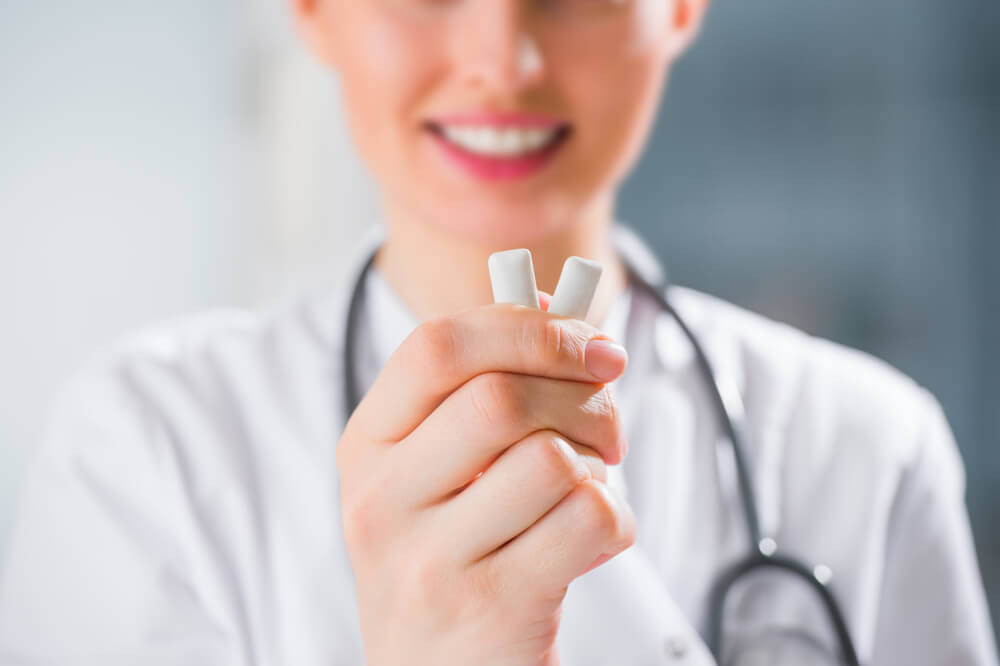Chewing gum packages line the shelves next to check-out counters and remain a staple in vending machines for good reason. More than 160 million Americans chew gum, making it a multi-billion dollar industry.
Of course, just because millions of people do it doesn’t mean it’s good for you, right? Actually, there are notable advantages of chewing gum. From your oral health to your mental health, popping a stick of gum could give you a boost. Let’s take a look at some of the top benefits of chewing gum!

Chewing Gum Basics
Before we discuss the benefits of gum, it helps to know the basics. For example, chewing gum isn’t a modern concept, it dates back centuries to the Mayans, Aztecs, Egyptians, and early Europeans.
Early chewing gum came from tree sap, but today manufacturers use synthetic rubbers. That may sound a little gross, but it’s not like the rubber used for tires and shoes. Plus, gum makers use organic elements and food substances to round out each stick.
Today, we even have access to sugar free options thanks to substances like xylitol. These sugar substitutes have few calories and a lower glycemic index than regular sugar.
Is chewing gum good for you? Let’s see…
Read more: Removing Plaque from Your Teeth
Chewing Gum to Improve Oral Health
It may seem strange to consider chewing gum for dental health purposes, but there are several reasons to consider popping a stick or two throughout the day. Sugar free gum benefits your teeth and gums in a few major ways.
Summary
While chewing on gum may not immediately seem like a healthy choice, there are actually some notable advantages. From improving oral health to boosting mental well-being, chewing a stick of gum can offer a range of benefits. It’s interesting to note that chewing gum has been around for centuries and has evolved from tree sap to synthetic rubbers, with modern options including sugar-free varieties made with organic elements like xylitol. When it comes to oral health, chewing sugar-free gum can actually be beneficial in multiple ways.
Protect Your Teeth
Among the benefits of chewing gum after eating is that it clears out food debris. When you can’t brush immediately after eating, chewing sugarless gum could protect your teeth against damage from bacteria and food particles.
It’s important to choose sugar-free options, like those with xylitol because xylitol gum benefits your dental health since it doesn’t feed harmful bacteria in your mouth. Additionally, sugar-free chewing gum increases saliva production, which neutralizes acid in your mouth and prevents dry mouth.
Remember, chewing gum isn’t a substitute for your normal oral care routine. Even if you chew sugar free gum after eating, it’s important to brush and floss regularly to keep your teeth and gums healthy.
Say Good-bye to Bad Breath
Nobody loves having bad breath, especially after eating a meal. One of the pros of chewing gum is that it freshens your breath. At the very least, chewing gum masks strong odors from foods like onions and garlic.
Read more: How to Floss Your Teeth Properly
Gum Chewing Can Help Your Digestive System
Chewing gum sometimes gets a bad rap because some people believe the old folk tales about swallowing it. Generally chewing gum doesn’t block your intestines or hang around for years and years, and the good news is that there are some excellent digestive health benefits of chewing gum.
Minimize Acid Build-Up
Do you struggle with heartburn? Pop a stick of gum after eating to lower the acid build-up in your esophagus to ease heartburn and acid reflux symptoms. Chewing gum encourages saliva production and makes it more alkaline so that it can neutralize acid.
Manage Your Appetite
Did you know that chewing gum can help you manage your weight? At least one study showed that gum can help control your appetite and encourage better dietary choices. Plus, you can burn a few extra calories by chewing gum!
Combat Nausea
Do you get motion sick? Try chewing gum with mint or ginger. Not only does the constant chewing produce more saliva and ease acid build-up, but the mint and ginger also work as well or better than some anti-nausea drugs. The best part is that it also works for pregnant women fighting morning sickness!
Summary
Chewing sugar-free gum after meals can benefit your teeth by helping to clear food debris and protect against bacterial damage. Opting for sugar-free gum with xylitol is particularly advantageous as it doesn’t feed harmful mouth bacteria and increases saliva production, neutralizing acid and preventing dry mouth. However, it’s important to remember that gum is not a substitute for regular oral care, so brushing and flossing remain essential. In addition to dental benefits, chewing gum freshens breath, aids digestion, minimizes acid build-up, helps manage appetite, and can even combat nausea, making it a versatile and convenient option for various situations.
Get a Mental Boost
Would you believe that gum also gives you a mental edge? It’s true for many people. Chewing gum can impact your mental status in several ways.
Engage Mentally
Do you race for a cup of coffee or tea when you feel sluggish in the afternoon? Try grabbing a stick of gum instead. Not only does chewing gum wake you up, it helps you engage in tasks by stimulating blood flow to the brain. Chewing gum also improves memory and cognitive performance thanks to the extra blood flow and oxygen to the brain.
Manage Anxiety and Stress
If you need a healthier way to manage nerves, gum may be your ticket. Chewing gum has been linked to improved mood, less fatigue, and a drop in nervous habits. It’s likely due to the calming effects of repetitive motions and the drop in cortisol production.
Additional Health Benefits of Chewing Sugar Free Gum
Chewing gum doesn’t just help your oral, digestive, and mental health. A well-timed stick of gum could impact you in other ways.
Ease Ear Pressure and Pain
If you ever drove up into the mountains or flew on a plane then you probably experienced ear pressure and popping. Chewing gum can relieve that pressure and pain because as your jaw opens and closes it can equalize the internal and external pressure.
Quit Smoking
The benefits of quitting smoking cannot be understated, and chewing gum can help curb your cravings. It’s best to incorporate gum chewing as part of a complete program to help you succeed.
Potential Benefits of Chewing Gum for Face Muscles
Some people suggest that since chewing gum works many muscles in your neck and face that it can reduce a double-chin and improve your jawline. While there’s no conclusive support for these ideas, it’s an interesting notion that we couldn’t overlook.
Chewing gum has many benefits, but it isn’t a replacement for your oral care routine. Brushing and flossing daily remains necessary to maintain your oral health. It’s also necessary to see your dentist every six months for check-ups and professional teeth cleanings to monitor for any potential issues.
If you’re due for a check-up and teeth cleaning, the team at Jefferson Dental & Orthodontics can help! Book an appointment at the office nearest you.




